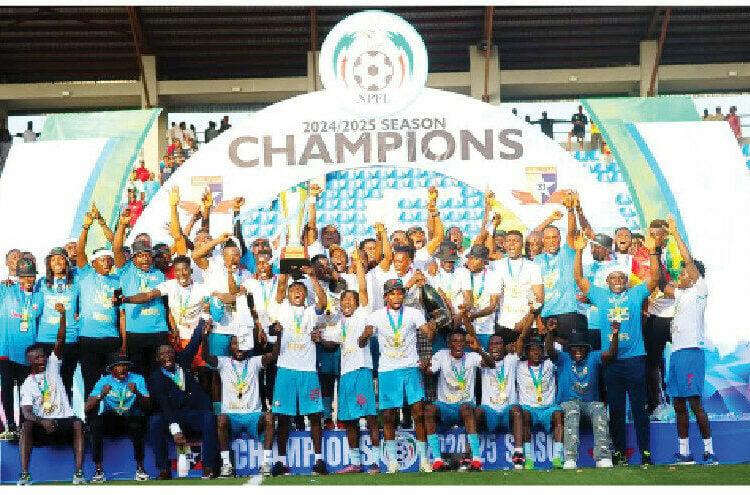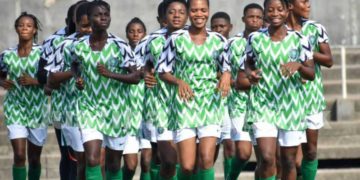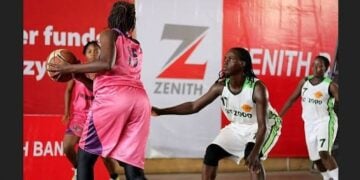As foreign clubs increasingly dominate the football landscape in Nigeria, SALIFU USMAN examines how the Nigeria Premier Football League (NPFL) struggles to reignite local passion and fan engagement, with a view to recapture the hearts of Nigerians and attract essential investment to secure the domestic football league future.
Football is not just a sport in Nigeria; it is a way of life, a cultural phenomenon that ignites passion and camaraderie among millions. However, the compelling allure of European football clubs has overshadowed the domestic scene, leaving the Nigerian Premier Football League (NPFL) struggling for attention.
It is bothersome that many Nigerians, including everyday citizens and influential leaders, seem better acquainted with foreign teams than with local clubs. This disconnect raises concerns about the future of local football, prompting a need for strategic initiatives that can bridge this gap and revitalise the domestic football leagues.
The 2025/26 NPFL season enters its matchday 3 this weekend, with mouth-watering fixtures. While many believed that the myriad challenges that have held back the NPFL over the years are not unconnected to systemic corruption, others argue that government interference in the local leagues—through ownership of the overwhelming majority of clubs, involvement in day-to-day activities, and a failure to provide incentives to private sports investors—poses even more damaging factors.
Vision for the future
In a bold move to rejuvenate the league, Hon. Gbenga Elegbeleye, chairman of the NPFL, has laid out a comprehensive plan aimed at increasing stadium attendance and enhancing fan engagement.
In an interview with LEADERSHIP Weekend Sports, Elegbeleye began by addressing the significant rise in stadium attendance, noting, “It was near zero before, but now you can see we are having full stadiums.” He highlighted the packed crowds at venues such as Liberty Stadium in Ibadan, Nnamdi Azikiwe Stadium in Enugu, Sani Abacha Stadium in Kano, Enyimba Stadium in Aba, Port Harcourt, and Remo Stadium, which have experienced enthusiasm from supporters for key matches. One of the key factors in this turnaround has been a stringent policy on fan behaviour, particularly around matchday violence. “We deduct three points from any club whose supporters misbehave… no club wants to lose three points, which can have serious implications for their season,” he explained. This measure has fostered a safer environment for fans, enabling them to enjoy the games without fear of violence.
As for enhancing fan engagement, he said NPFL is putting in place strict measures to expand its television presence. “We are on Startime, Gotv, Supersport,” the chairman stated, adding that fans can also watch matches through the NPFL app on their mobile devices. Furthermore, initiatives like awarding the man of the match and engaging directly with fans during match weeks have already begun to forge a deeper connection between clubs and their supporters. “This coming season, we hope to have more presence and responsibilities… we want our players to be known and celebrated, just like European stars.”
On the sponsorship front, Elegbeleye detailed the challenge of reviving a league that had previously struggled to attract corporate investment. “We inherited a league without sponsors… none of Nigeria’s league matches was on TV,” he remarked, explaining that the lack of visibility made it difficult to draw in prospective investors. The NPFL has worked diligently to sanitise the league, improving officiating by ensuring referees are paid on time—a stark contrast to the three and a half years of unpaid salaries that plagued the league previously. This financial stability is helping to restore trust and credibility, making the NPFL more appealing to potential sponsors and investors.
Additionally, in an effort to draw in more spectators, the chairman acknowledged the need to improve the stadium experience. “We need to make the stadium attractive… an environment where football is played needs to look serene and safe,” he stated, explaining that certain venues have been banned from hosting matches due to unsatisfactory conditions. By fostering a more enjoyable and secure atmosphere, he said the NPFL aims to encourage more fans to support local clubs.
With new sponsorship deals on the horizon, the former lawmaker turned football administrator remains hopeful. “Before we start the new season, or in one or two months’ time, we will sign some sponsorship deals, by God’s grace,” he affirmed.
As the NPFL seeks to revitalise its league, the commitment to improving fan engagement, stadium environments, and operational credibility positions it for a promising future. With these concerted efforts, the NPFL aims not only to reclaim its place in Nigerian sport but also to cultivate a loyal following that proudly supports homegrown talent.
Government ownership and the call for change
However, the road to recovery is fraught with obstacles. Harrison Jalla, chairman of the Professional Footballers Association of Nigeria (PFAN) Task Force, lamented the detrimental effects of government ownership on club management and sponsorship. He called for a restructuring of the local league to rekindle fan interest and attract investment from wealthy individuals who can elevate local clubs to the heights they once enjoyed.
Jalla noted that Nigeria’s football league did not struggle for sponsors in the 1970s to early 1990s. However, since at least 1999, the reverse has been true. The Nigerian oil and gas sector—both upstream and downstream—the financial sector, the technology sector, and the telecommunications sector, among others, are growing and expanding, which should naturally lead to more sponsorship funds for football. That has not happened.
Jalla reminisced about the days when clubs flourished under the ownership of notable personalities and parastatals, highlighting how the rich football culture of the past has faded in comparison to today’s landscape.
He pinpointed management as the crux of the problem, asserting that while Nigeria’s football is organised, it lacks viability due to poor administration. “Football has the potential to be one of the biggest industries in Nigeria, next to oil and gas,” he stated, emphasising the country’s wealth of talent and passion for the sport.
However, he argued that the right leadership is crucial to harness this potential, urging wealthy individuals like Aliko Dangote, Mike Adenuga and others to invest in local football. Reflecting on the vibrant atmospheres of past matches, Jalla lamented the current trend where fans flock to viewing centres for foreign leagues rather than attending local games. “When two Nigerian clubs play, the stadium is empty while fans are glued to Premier League matches,” he pointed out, calling for a restructuring of the local league to rekindle fan interest.
He raised concerns about Nigeria’s poor ranking in the continental football scene, stating, “No Nigerian club is among the top in the CAF rankings, a far cry from our past when clubs like Enyimba dominated.” Jalla emphasised the necessity for improved sponsorship and governance, stating that without significant changes, the rich cultural and economic potential of Nigerian football will remain untapped.
Highlighting the financial dynamics of football, he noted that revenue from television and betting could potentially sustain local clubs, provided the right strategies and management are in place. “Betting alone can sustain football in Nigeria,” he suggested. Furthermore, he warned that if the wrong individuals remain in charge, the opportunities for growth could slip further away.
With a passionate plea for action, Jalla reminded stakeholders that football is more than just a game; it has the power to employ thousands and drive economic growth. “We need to go back to the drawing board and harness the incredible potential that exists within our football,” he urged.
The call for change is clear: revitalise the administration, rekindle local passion, and leverage the wealth of potential in Nigerian football to bring the sport back to life and restore its rightful place in the hearts of Nigerians.
Visibility and investment
Abuja-based FIFA, agent Ifeanyi Omonigbo, echoed these sentiments, asserting that the love for foreign clubs does not threaten local football. Instead, he highlighted the lack of visibility as the primary challenge. Omonigbo urged for greater support and exposure for local clubs, suggesting that high-profile endorsements and public statements from leaders could significantly boost the profile of the NPFL.
However, he emphasised that the real challenge lies in the apparent lack of deliberate and purposeful support aimed at boosting the visibility of local clubs and leagues.
While acknowledging the efforts of some state leaders, Omonigbo pointed out that broader challenges remain. He commended the initiatives of Governor Peter Mbah of Enugu State and Governor Douye Diri of Bayelsa State, who have shown unwavering support for their state clubs. Yet, he argued that these positive examples are not enough to overcome the systemic issues plaguing the league.
“Almost every challenge in our league—from attendance revenue, youth inspiration, and talent retention to sponsorship and investment growth—comes down to one factor: appealing visibility,” Omonigbo explained. He argued that both local and global football enthusiasts can only support what they know and regularly see. “If we make our clubs and league visible, exciting, and worth talking about, many other things will naturally fall into place,” he added.
Omonigbo proposed several transformative strategies that could significantly boost the profile of Nigerian football. He envisioned a scenario where political, business, and cultural figures regularly attend Nigeria Professional Football League (NPFL) matches, thereby making matchday attendance a trend. He also suggested that high-profile endorsements could make local football more attractive to sponsors and investors, unlocking better facilities, improved player salaries, and stronger marketing strategies.
Corruption
To gain private sector confidence and attract high-profile investors, the Nigeria Premier Football League must address and cleanse itself of the numerous issues, including corruption, according to Ahmed Shuaibu Gara Gombe, the former chairman of Gombe United FC and a prominent sports critic.
In a conversation with Weekend LEADERSHIP, Gombe highlighted the stark contrast between local and international clubs. He asserted that the appeal of foreign football clubs among Nigerians reflects their successful brand management and global reputation. Gombe cited Manchester United, Arsenal, Chelsea, and Liverpool as prime examples of well-managed brands that operate on a corporate level. “These individuals can proudly wear the kits of these foreign clubs, purchase their merchandise, and adorn their homes with their emblems,” he remarked, “yet it is rare to see the same enthusiasm directed towards Nigerian clubs.”
Focusing on the example of Senator Orji Uzor Kalu, the former governor of Abia State, Gombe noted the disconnect between Kalu’s previous efforts to elevate Enyimba FC to international standards and his current lack of support for the club. “When was the last time you saw him in Enyimba kits or attending their matches?” Gombe challenged, emphasising that Nigerian clubs lack the professional management and branding seen in their foreign counterparts.
Gombe attributed the overwhelming ownership of Nigerian football clubs by state governments to a cascade of issues. He identified politics as a detrimental force, with clubs often used as tools for economic gain or to reward political loyalists rather than fostering genuine development in the sport. “Hooliganism, match-fixing, poor officiating, corruption, and political interference are rampant characteristics of the Nigerian league,” he lamented.
Reflecting on his experiences in the industry, Gombe recounted a meeting with billionaire businessman Aliko Dangote, who expressed interest in transforming BCC Lions. “The system is not conducive for such ambitions,” Gombe stated, emphasising the necessity for proper management and rebranding within Nigerian football clubs.
“Today, we do not have a league that we can be proud of. If we are to attract high-profile individuals to invest in our clubs, we must cleanse ourselves of the numerous issues plaguing our football landscape.” His insights resonate with an urgent call for reform in Nigerian football, paving the way for a more professional and credible sporting environment.
Football enthusiasts say to reconnect Nigerians with their football clubs will require a multifaceted approach—one that combines community engagement, improved matchday experiences, technological integration, and corporate investment.
They say the NPFL’s commitment to transparency and fan engagement, along with the urgent call for reform, will pave the way for a promising future.
As the new season progresses, they are of the opinion that the time has come for Nigerians to embrace their local clubs, revitalise their passion for homegrown football, and create an environment where the NPFL can once again flourish. They say the potential is immense. ‘‘The call to action is clear: it’s time to rally behind the league that represents the heart of Nigerian sport,’’ one of them said.
However, to attract corporate investment, the NPFL must demonstrate its potential as a viable business opportunity and establishing clear partnership frameworks and showcasing the league’s marketing potential can entice companies to invest. Additionally, sponsorship deals should involve mutual benefits, such as promotional opportunities at matches and within club communities. By involving corporate sponsors in the very fabric of the clubs’ activities, businesses can build strong connections with fans and communities alike











